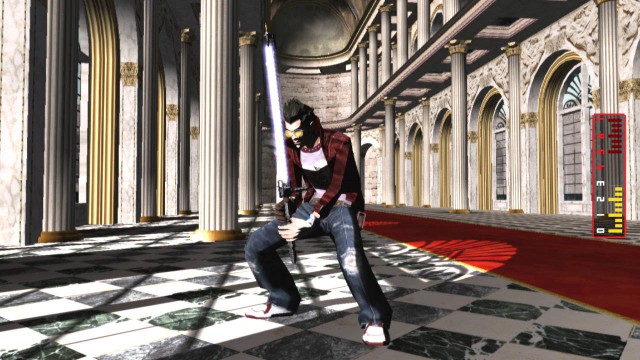
In case you missed it, there was somewhat of a discussion of games-as-art lately here at Nintendojo: Pro-art, Not-art.
Let’s get out of that boring introductory paragraph and get to the good stuff, though:
Oh no, I’m chiming in!
Let me set the record straight, really quick like. If you hear a loud screech it’s because I made a really bad pun but couldn’t work it into words (it was the record coming off the record player, in case you missed that one). The question is not whether or not games are art – they are (something about expression as the definition of art) – but rather what do we do with the knowledge that games are in fact a form of art: where do we go now?
See, here’s my take on it; this whole games are art business? It’s poison for the industry. Death poison, spawned by deathly death… things. It’s not good. Kind of like that butchered metaphor.
Can I say that and just walk away now? Probably not; man, having to support myself is such a hassle.
A game is a form of entertainment; it can certainly be more than that, but the purpose of a game is to entertain: to be fun. It’s more than art, and that’s the problem that’s starting to emerge: games are beginning to have more of an aesthetic focus than an entertaining one due to this “games are art” dealie-o going on. And that’s fine, really. There isn’t anything wrong with a gorgeous game, or one that tries to break boundaries; the problems emerge when fun is sacrificed for art. No More Heroes did this; it attempted to mock open world games like Grand Theft Auto, but provided, rather than an open world, the illusion of one, a world that could not be interacted with (for the most part). Yes, it’s a statement about the shallowness of such games, but at the same time Suda 51 sacrificed a core element of gameplay to do so; a lot of potential fun was drained from the game in order to make this unnecessary statement.
Games are different than traditional art in that sense because of the need to entertain. Creating a game for the sake of making a game is not going to cut it. Whereas that kind of objective works for a painting, a video game is an entirely different matter due to the level of interaction between the finished product and its audience. Games that are made for the sake of games are neat once (Braid is a great example; why would you ever want to play it a second time?), but they provide little else to society. Such an endeavor is alright for music, paintings or writing because they don’t necessarily need to provide an interactive experience: they have a different purpose from games which involves a more show-like nature that the audience does not directly affect, as opposed to a video game’s fundamental involvement of the player. The basis for both might be that of entertainment, but video games are a joint experience; they require so much more of the audience than a movie. Unless we’re talking about Final Fantasy 12, which was a movie that pretended to be a game. OH, SNAP.
It’s interacting compared to viewing, and that interaction needs to be fun.
Seriously. Get over games being art and get back to just enjoying them for what they are: games. Sitting around and arguing about what something is or is not is pointless meandering; nothing positive can come of it. Whether or not games are art is irrelevant to the subject material anyway, and insisting that they are, that they be regarded as such, can only serve to impose unnecessary and harmful requirements upon video games. The ones that are truly fun are the ones that made a franchise what it is today; they’re the ones that made people say “Hey, look at this. This is art.”
Let it go and allow games to evolve by themselves. Art for art’s sake is and has always been very, very awful, so don’t allow that to happen to games by requiring them to live up to some arbitrary artistic standards.




 ShareThis
ShareThis







Yeah, there’re a lot of people who don’t appreciate art. Hitler didn’t.
You do realise that Hitler was an artist?
Unless that was your point…then it didn’t come across.
I believe that was his point, at least, that’s what I got out of his comment.
Maybe it’s the British sense of humour? Hitler failed to get into the Austrian art school and so moved to Germany and things started going… badly. Textbook artist with a grudge. Personally don’t get how that means he didn’t appreciate art but oh well, I’ll go along with it.